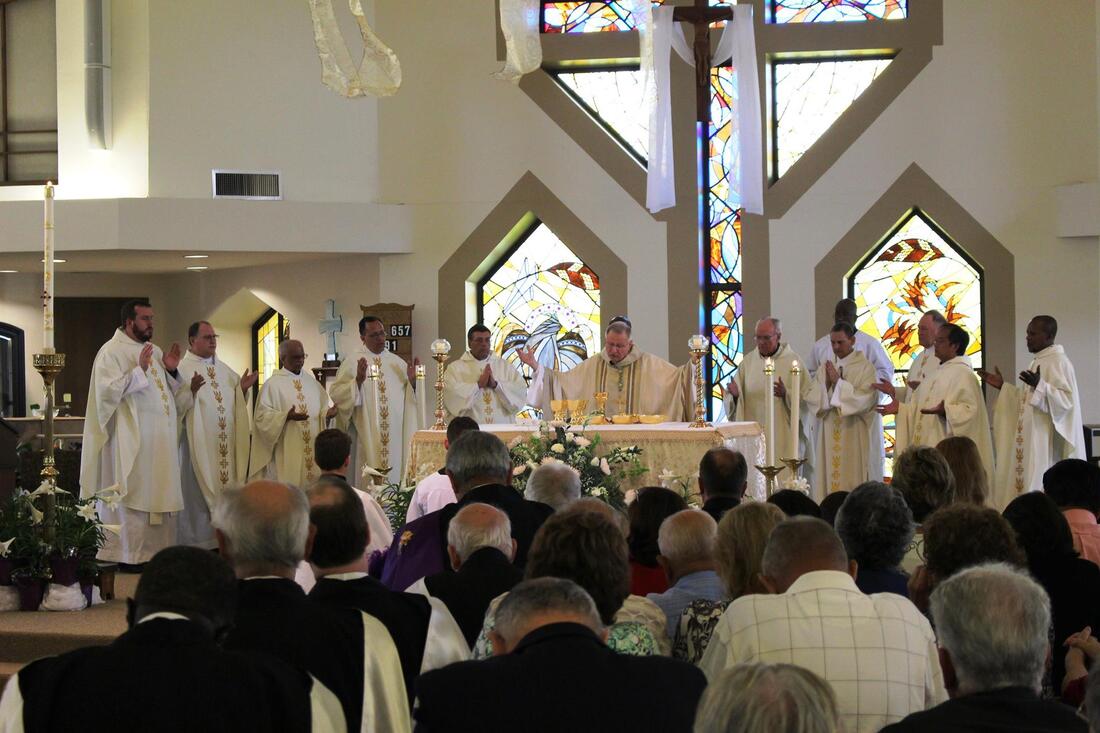|
St. Ignatius of Antioch, in his letter to the Ephesians, wrote, “Take heed, then, often to come together to give thanks to God, and show forth His praise. For when you assemble frequently in the same place, the powers of Satan are destroyed, and the destruction at which he aims is prevented by the unity of your faith. Nothing is more precious than peace, by which all war, both in heaven and earth, is brought to an end.” From the earliest days that Christian community used to come together in one place to worship God and to give Him thanks. Remember that the Greek word eucharistia means giving of thanks.
How did the early Christians understand this teaching on the Eucharist? In his letter to the Philadelphians, St. Ignatius of Antioch wrote, “Take heed, then, to have but one Eucharist. For there is one flesh of our Lord Jesus Christ, and one cup to [show forth] the unity of His blood; one altar; as there is one bishop, along with the presbytery and deacons, my fellow-servants: that so, whatsoever you do, you may do it according to [the will of] God.” St. Ignatius of Antioch died between 98 and 117 AD. In an early Christian work called the Didache, there is a description of the Mass, “But every Lord’s day gather yourselves together, and break bread, and give thanksgiving after having confessed your transgressions, that your sacrifice may be pure. But let no one that is at variance with his fellows come together with you, until they be reconciled, that your sacrifice may not be profaned. For this is that which was spoken by the Lord: in every place offer to me a pure sacrifice; for I am a great King, says the Lord, and my name is wonderful among the nations.” Finally, the first detailed account of the Mass in the early Church comes from St. Justin Martyr, who would eventually die for the faith. He wrote several works defending the faith. One of these, The First Apology, was addressed to the Emperor Titus Aelius Adrianus Antoninus Pius Augustus Caesar, who reigned from 138-161 AD, so it must come from that period. “And on the day called Sunday, all who live in cities or in the country gather together to one place, and the memoirs of the apostles or the writings of the prophets are read, as long as time permits; then, when the reader has ceased, the president verbally instructs, and exhorts to the imitation of these good things. Then we all rise together and pray, and, as we before said, when our prayer is ended, bread and wine and water are brought, and the president in like manner offers prayers and thanksgivings, according to his ability, and the people assent, saying Amen; and there is a distribution to each, and a participation of that over which thanks have been given, and to those who are absent a portion is sent by the deacons. And they who are well to do, and willing, give what each thinks fit; and what is collected is deposited with the president, who succors the orphans and widows and those who, through sickness or any other cause, are in want, and those who are in bonds and the strangers sojourning among us, and in a word takes care of all who are in need. But Sunday is the day on which we all hold our common assembly, because it is the first day on which God, having wrought a change in the darkness and matter, made the world; and Jesus Christ our Savior on the same day rose from the dead” (St. Justin Martyr, The First Apology, chapter 67). This description is remarkably similar to what the Church is still doing today. They gathered specifically on Sunday. They have readings from the Old and New Testaments, although they weren’t called that yet, and then the “president,” or presider, instructs and exhorts the people, reflecting on the readings. Then they rise and pray, bread and wine and water are brought up, and the presider prays over them and distributes them to the people, and the deacon takes some to those who are absent. Then a collection is taken up, so we can see that the collection is actually an ancient tradition of the Church. About the Eucharist, St. Justin Martyr clarifies, “For not as common bread and wine do we receive these; but in like manner as Jesus Christ our Savior, having been made flesh by the Word of God, had both flesh and blood for our salvation, so likewise have we been taught that the food which is blessed by the prayer of His word, and from which our blood and flesh by transmutation are nourished, is the flesh and blood of that Jesus who was made flesh” (chapter 66).
0 Comments
Your comment will be posted after it is approved.
Leave a Reply. |
AuthorFr. Bryan was pastor of Our Lady of Lourdes from July 3, 2017 to June 2022. Categories
All
Archives
June 2022
|

 RSS Feed
RSS Feed